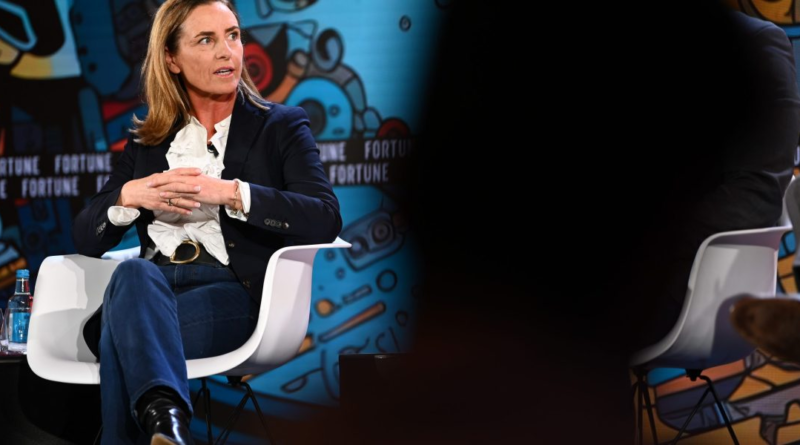Jamie Dimon’s JPMorgan and other North American banks are so far ahead in the AI race that one indexing boss says it’s now a question of ‘Can others catch up?’
While the likes of Google, Amazon and OpenAI battle it out in Big Tech for the top spot, JPMorgan is quietly winning Wall Street’s own contest: leading the AI race in banking.
At least, that’s according to one expert who appeared at Fortune’s BrainstormAI conference in London this week.
For Alexandra Mousavizadeh, co-founder and CEO of benchmarking platform Evident Insights, it’s no longer a case of how businesses can compete with North American banks when it comes to the tech—but how they can even catch up.
Speaking to Fortune‘s Massimo Marioni, Mousavizadeh outlined her company’s ‘evident index’ which assesses how ready businesses are for the incoming wave of transformation which AI will bring.
JPMorgan Chase—which had a record-breaking profit of $49.6 billion in 2023—lead the pack, followed by Capital One, Royal Bank of Canada and Wells Fargo.
The Jamie DImon-led firm ranked first in innovation—be it research or patents—and transparency around responsible AI activities. It ranked second in talent and leadership, leading to the top spot overall in the November 2023 ranking.
“It was interesting to see that in the top 10 or the top 20, they were dominated by North American banks,” said Mousavizadeh. The top three are “very different banks” she added, but continued: “What they did have in common, or what they do have in common is having been out the gate and very forceful on… being very clear about what that AI vision is.
“Then all that followed was pushing very hard to hire AI talent, setting up research labs, really thinking about their innovation strategy and structure, research and patents and partnership and vendors so on, and then looking at the operating model—all with the view to: ‘How can we get the time from ideation to production down?’”
The index is updated annually with Mousavizadeh saying it will be “very interesting” to see how the rankings of the index shift in the coming years.
However Mousavizadeh said it’s now a question of “can one catch up” with the top banks like JPMorgan, explaining: “The banks that are leading are really doubling down. So there is a bit of a gap that is growing between the leaders in the index and those further behind because there is such an advantage in being the first mover because you’ve established a reputation to draw in AI talent.”
In his letter to shareholders this year Dimon—who was paid a record $36 million for his work last year—said the business has been using AI and machine learning for “years.”
The bank has identified more than 400 use cases for the technology across marketing, fraud and risk, amassed thousands of AI experts and data scientists and begun exploring deploying generative AI, Dimon said.
The Wall Street giant had initial set itself a target of generating $1 billion in real “business value” in 2023, but according to Bloomberg increased that goal to $1.5 billion early in the year—in May at its investor day.
Focus—and a drive for results—at JPMorgan will be expected by Dimon’s team, with the 68-year-old openly making predictions about the tech’s impact on the economy.
AI will reduce workers’ weeks to 3.5 days a week, the Harvard alumni said in October, with people living to 100 years old.
Speaking to Bloomberg TV, Dimon said fears over AI replacing human’s roles is offset by the massive benefits it could bring. “Technology has always replaced jobs,” he explained. “Your children are going to live to 100 and not have cancer because of technology, and literally they’ll probably be working three and a half days a week.”
In February this year Dimon doubled down that AI is not “hype,” saying: “This is real.”
Learning from the leaders
However, capitalizing on the path already forged by market leaders is an area where outliers on the index can surge ahead.
Mousavizadeh explained: “Any bank that decides to really focus in on this now [can be] looking at what are the leading banks doing, and taking what is the best approach for that specific bank, absolutely a bank can catch up in terms of being very clear about the vision, being very articulate both internally and externally to make sure that AI is the absolute most important thing for any leader of any line of business.”
Of course, the key to staying ahead could come down to talent and having the people on board to keep innovating. According to a 2023 Salesforce survey of more than 11,000 workers only one in 10 workers around the world possess the in-demand skills relating to AI.
And that finite talent has a lot of places they could go, Mousavizadeh added, meaning attracting skilled labour should also feature high up the agenda for bosses.
“One needs to make the bank a really attractive place to work,” she said. “So that is can you show your research, is there access to be active on sharing on open source communities, are there really interesting problems to work on, is it a priority of the bank?
“Those are some of the many ways that banks can focus on [AI] now and catch up.”




